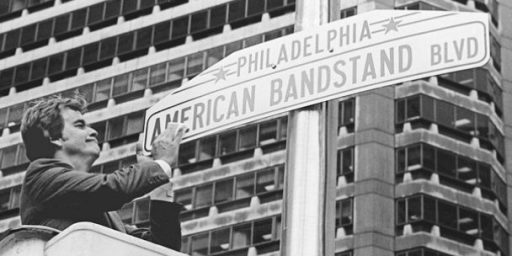CLARK: WHAT DEMOCRATS NEED?
James Pinkerton thinks so:
When parties want to win back the White House, they run candidates like Wesley Clark. Which explains why the Democrats are unlikely to nominate the retired four-star general next year — they’re not hungry enough yet.
Clark’s announcement speech in Little Rock yesterday was vague, but his mere presence in the presidential race will transform the contest. His repeated criticisms of the Iraq war will enable Democratic doves to wrap themselves in his hawkish colors.
Having graduated first in his class at West Point, having won a Silver Star and a Purple Heart in Vietnam, having served for a total of 35 years in the Army, Clark will likely emerge as the arbiter of military issues for Democrats. So watch for the other nine presidential hopefuls to couch their criticism of President George W. Bush’s Iraq war policy in Clarkian terms. That is, they will begin their sentences with, “I agree with General Clark that George Bush has mishandled. . .”
Quite possible, although I still maintain that Kosovo isn’t likely to give him that level of credibility.
A candidate such as Clark is exactly what the Democrats need. Throughout American history, the political party associated with the North, the more naturally dovish part of the country, has often needed to shore up its credibility on national security issues. After all, it was the South that was the traditional bastion of hawkery, even militarism. So to counteract that Dixie strength, the Yankee-dominated party – the Whigs in the early 19th century, the Republicans from the mid-19th to mid-20th century – often resorted to nominating military men.
The two presidents elected on the Whig ticket were both war heroes, William Henry Harrison and Zachary Taylor, sent to the White House in 1840 and 1848. After Abraham Lincoln, the Republican presidents of the following four decades were all Civil War vets. Then came Theodore Roosevelt, the hero of the Battle of San Juan Hill during the Spanish-American War, elected to the White House in 1904. And after World War II, the Republicans, tagged as the isolationist party, couldn’t win back the White House until they ran five-star Gen. Dwight Eisenhower.
Since then, of course, the geographical hubs of the two parties have switched. The Republicans have moved South, the Democrats North. So if the Democratic Party elders could choose a presidential candidate in the proverbial smoke-filled room, they might well choose Clark to toughen up their image during wartime. But there’s a problem: There are no smoke-filled rooms any more, and no elders with any power. The bosses are long gone; the new powerbrokers are the voters themselves, in early caucus and primary states such as Iowa and New Hampshire.
An interesting historical insight that hadn’t occured to me before. I’m not sure the analysis works since Eisenhower, though. Kennedy was considered a WWII hero, but that was when the Democrats were still mainly a Southern party.
The Democrats’ last three successful presidential candidates (Johnson, Carter, and Clinton) have been non-soldiers (although Carter was an Annapolis grad) and Gore won the popular vote without a distinguished military record.



